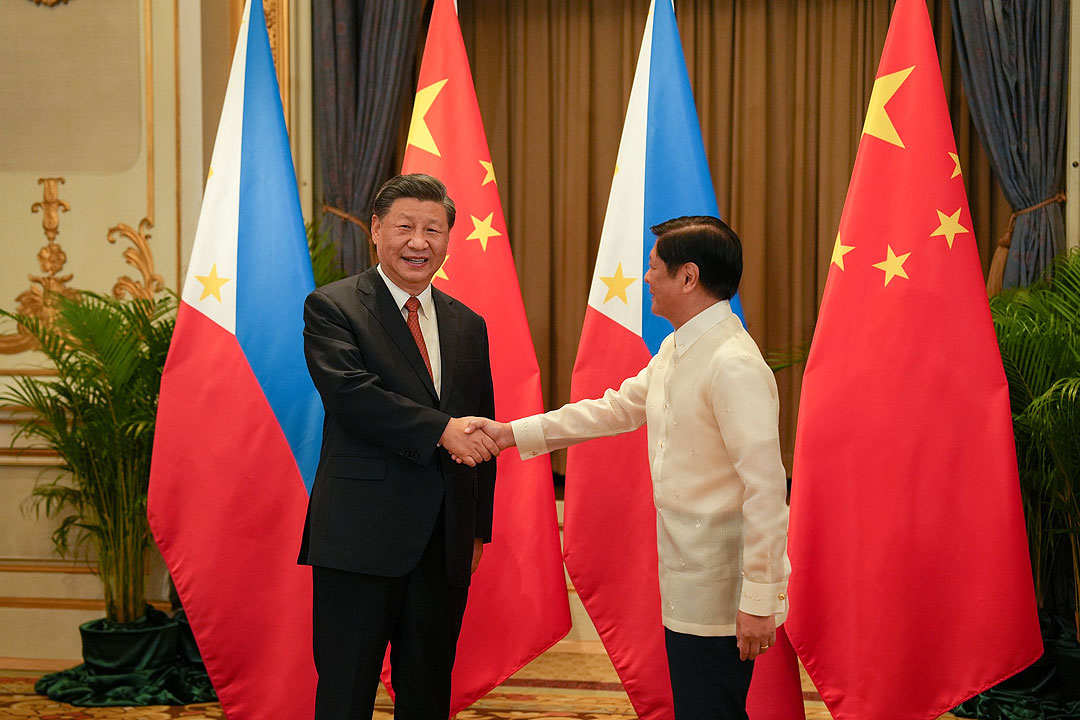Marcos told to use security ties as bargaining chip in talks with China

By Kyle Aristophere T. Atienza, Reporter
THE GOVERNMENT of Philippine President Ferdinand R. Marcos, Jr. could demand more trade concessions from China after boosting its defense ties with various countries including the United States, security analysts said at the weekend.
“The Marcos administration, by its recent moves to embrace a bold new maritime transparency policy and enhance its security relationships with partners like the US, Japan and Australia, has shown strength and given itself leverage for negotiations with China,” Raymond M. Powell, a fellow at Stanford University’s Gordian Knot Center for National Security Innovation, said in a Facebook Messenger chat.
He urged the Philippines to keep building its leverage and avoid trading it away for “promises and assurances that have proven empty in the past.”
Philippine Foreign Affairs Undersecretary Theresa P. Lazaro on Mar. 24 said Manila and Beijing had agreed that their maritime issues “should be addressed through diplomacy and dialogue and never through coercion and intimidation.”
Ms. Lazaro issued the remarks during a bilateral consultation on the South China Sea issue in Manila.
At the meeting, China’s Vice Foreign Minister Sun Weidong said the two countries have “generally managed and effectively dealt” with their differences on maritime issues. “We have also advanced our practical cooperation and our mutual trust.”
A few days before the meeting, China accused the US of worsening regional tensions by boosting military deployment in the Asia-Pacific region.
Chester B. Cabalza, founding president of Manila-based International Development and Security Cooperation, said China’s push for diplomacy in its sea dispute with the Philippines seeks to pacify Manila’s “impulsive behavior to realign its defense posture with the US.”
“Beijing has engrossed in its maritime narrative a framework of a good neighbor and stakeholder in the South China Sea,” he said via Messenger chat, noting that China has rejected a Philippine push for joint patrols with like-minded countries and wishes a regular bilateral talk on their sea dispute.
“It is now up to Manila on how it will shape the contours of the regional security environment as it balances with Beijing and Washington.”
The Philippines secured several trade deals during Mr. Marcos’ state visit to China in January covering agriculture, renewable energy, nickel processing, tourism and bridge construction.
On Mar. 23, the president told Filipino-Chinese businessmen in Manila his government was pursuing 90 active investment leads from Chinese companies in manufacturing, information and technology, business processes management and renewable energy.
‘MORE LEVERAGE’
His predecessor Rodrigo R. Duterte had been accused of gambling Philippine territories to appease China, from which he got about $24 billion in investment and loan pledges primarily to boost big-ticket infrastructure projects. Few of these materialized.
Mr. Powell said the Marcos government seems to have “taken to heart” lessons from Mr. Duterte’s foreign policy, which “gave China much of what it wanted by turning away from its US alliance and downplaying its maritime concerns.”
“Rather than rewarding this acquiescence by making concessions of its own, Beijing exploited the opportunity to further expand its presence in the West Philippine Sea,” he said, referring to areas of the sea within the country’s exclusive economic zone.
Last month, the Philippines gave the US access to four more military bases under their 2014 Enhanced Defense Cooperation Agreement (EDCA) — a move that has angered Beijing.
While the EDCA expansion has complicated Philippine-China relations, Mr. Marcos could use it as a bargaining chip in negotiations with China, Kwei-Bo Huang, director of the Center for Global and Regional Risk Assessment at the National ChengChi University in Taipei, said via Messenger chat.
Emerson De Yi-Zhou, a research assistant at the Center of Foreign Policy Studies of the National Chengchi University in Taiwan, echoed the sentiment, saying the EDCA expansion “gives the Philippines more leverage.”
The Philippines was eyeing several security partnerships with other countries, including a tripartite security pact with Japan and the US. The Southeast Asian nation was also in talks to include Australia and Japan in planned joint South China Sea patrols with the US.
Mr. Cabalza said the Philippines and China should identify a middle ground to cool sea tensions.



